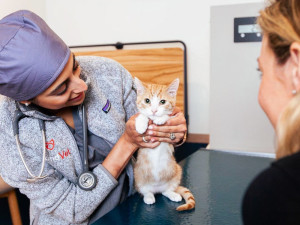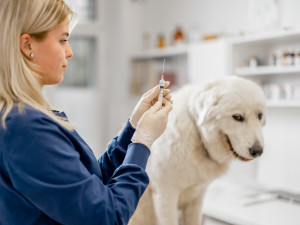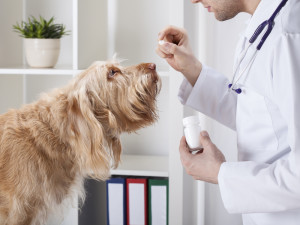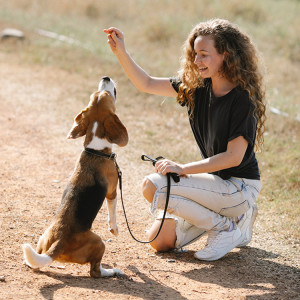10 Tips to Give Your Dog a Blissful Vet Visit
Reduce the stress of veterinary visits — for you and your pup.
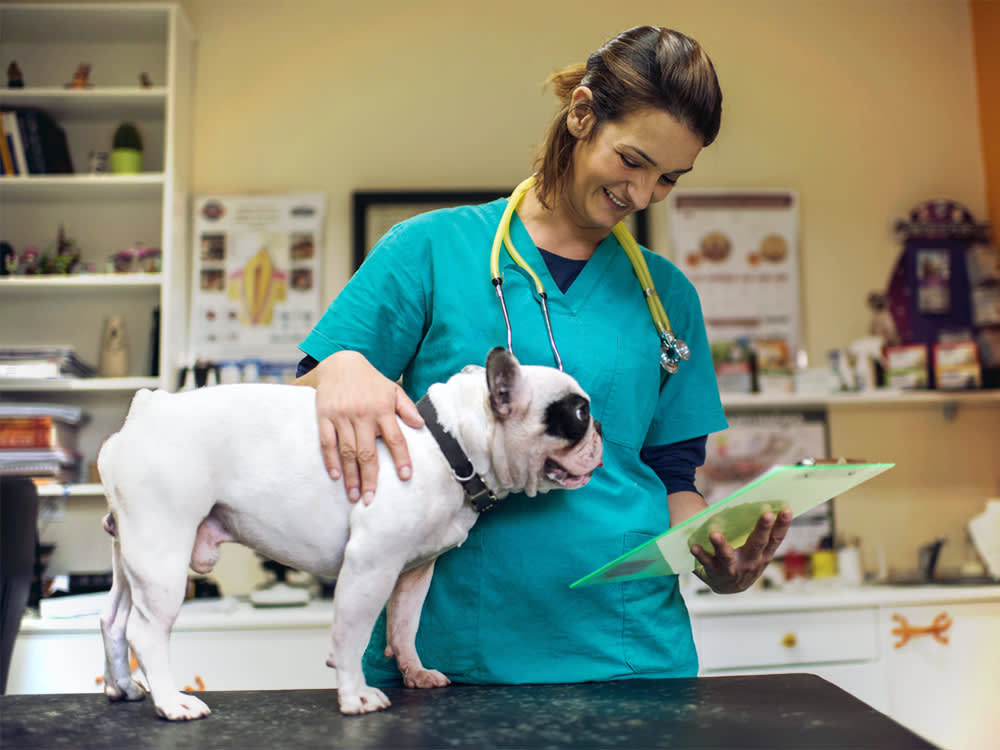
share article

Your pet wants you to read our newsletter. (Then give them a treat.)
Not many dogs are fans of going to the vet. Some may display unruly behavior, signs of stressopens in a new tab (shakingopens in a new tab and salivating), or even aggressionopens in a new tab. Unfortunately, you can’t simply explain to them that even though it might not always seem like it, the vet has their best interests at heart. How then — for the sake of your dog, yourself, and your veterinarian — can you help your pup to love (OK, calmly tolerate) a visit to the vet? Learn how to keep your dog calm and less stressed at the vet with these steps for vet-visit bliss, or something close to it.
1. Choose the right vet.
This is obvious but important. Of course, you want your vet to be up on the latest in the field of veterinary medicineopens in a new tab, but equally important is someone who is willing to take time with a skittish, anxious, or even just highly exuberant dog. The entire clinic staff should be sensitive to your dog’s needs. Ask the veterinary practice directly about their willingness to work with you if your dog is struggling to cope. Shop around — if a vet isn’t interested in accommodating you, find one who is.
Good practices include using treats opens in a new tabto help dogs feel happier and taking a little extra time to encourage (rather than force) dogs to do what they need to do. Lessons from veterinarian Sophia Yin’s Low Stress Handling, Restraint and Behavior Modification of Dogs & Catsopens in a new tab have made a huge difference for many dogs, so ask if your veterinarian is accustomed to incorporating them into their practice on a daily basis. Among the many issues Yin covers: getting dogs in and out of kennels and putting them on a leash, reading a dog’s visual signals to recognize stress and fear, various methods of restraint required for various procedures, how best to pick dogs up, detailed principles of classical and operant conditioning to modify behavior, and many other ways to minimize the emotional challenges dogs face at the vet.
2. Communicate with your vet.
Be clear with your veterinarian about what scares your dogopens in a new tab and what steps are possible to make your dog have a better experience at the office. Share any cues your dog knows that can be helpful, such as “sit,” “down,” and “stay,” as well as the other cues mentioned below.
Videos are a great way to share information about cues and problematic issues, so consider asking your veterinarian if you can send in videos to explain your dog to them. If they agree, be thoughtful of your veterinarian and veterinary technician’s time, and keep the videos brief. If the staff is not willing to look at these videos, consider that perhaps you haven’t found the right veterinarian for you and your dog.
3. Make vet days “fun days.”
Follow every veterinarian visit with a favorite activity, such as a swimopens in a new tab, a visit to the parkopens in a new tab, or a walk in the woodsopens in a new tab. Knowing that a good time will follow the vet visit can help your dog feel better about being there.
4. Train your dog to relax.
Teach your dog to relax in response to your touch by practicing dog massage at homeopens in a new tab. Then, give them a soothing massage during a vet visit, especially while in the waiting area. To increase its effect, practice it in a familiar setting rather than trying it for the first time at the vet’s office.
5. Train your dog in tricks.
To alleviate the stress your dog may feel at being physically manipulated at the vet, train your dog with useful tricksopens in a new tab that translate to the exam process — for example, teach them to step up onto a small platform when asked. This is a “trick” that works well for the vet’s scale.
Others include “belly up” for abdominal exams, “shake” to present a paw for blood draws, and “down/stay” for vaccinationsopens in a new tab, exams, and anything else that requires them to remain still. Besides making visits to the vet less stressful, training your dog to perform these behaviors on cue also shortens the visit, which, in turn, makes it less problematic for everyone (and may even leave more time for you to discuss your concerns with the vet).
6. Use counter-conditioning.
Counter-conditioning can be used to help prepare your dog for potentially scary things. This means teaching your dog to associate something that will happen during a vet visit with feeling good. Examples include teaching them that when someone examines their ears or their mouth, they will get a treat. With enough practice doing this in the right way (they’re not frightened and receive a treat), you can make these aspects of an exam no big deal for your dog.
7. Get acquainted first.
Make your first visit to the vet an opportunity to get acquainted — to sniff around the waiting room, meet the vet and the staff, and have a pleasant experience free of pesky exams or shots. If your dog is comfortable getting on the scale, a weigh-in is fine, but if not, skip it. Have everyone your dog meets be a source of the highest-quality treats you can provide — hamburger, chicken, real steak. If your dog is crazy about balls, chew toys, or squeaky toys, have the vet and the vet tech each give your dog one while in the exam room.
You want your dog to think that this is a place where the most wonderful things happen. I call these appointments “meet-and-greets,” and I advise them for dogs of any age. Simply call the vet and say that you’d like to make (and pay for) an appointment during which your dog is introduced to the facility and the staff. If they’re unwilling, consider looking for another vet.
8. Give lots of tasty treats.
Have everyone at the clinic give your dog lots of top-quality treatsopens in a new tab at every visit. This is “Vet 101” advice, but it’s popular for a reason: It works. If a dog learns that they get the most delicious treats in the world while at the vet, they are more likely to be cooperative about going there. To be successful, two important aspects of this strategy must be observed: First, use extra-special treats, not the ordinary kind; dry biscuits are just not going to have the same emotional impact. Which would you find more motivating, a chocolate chip cookie or a cracker? Second, unless it’s inappropriate for your dog’s health condition, be generous — multiple treats make more of an impression.
9. Plan your clinic entrances and exits.
Many dogs’ objections to the vet are really about the lobby or waiting area. If this applies to your dog, there are ways to get around the situation. Ask if there’s a back entrance that you and your dog can use. Also, try using your car as an alternate “waiting room,” and ask if someone will let you know when it’s time for the exam. At some clinics, a staff member will come out to your car or give you a call on your cell phone to let you know it’s your turn.
10. Finally, maintain a calm frame of mind yourself.
Your emotions are contagious — the more cheerful and relaxed you are, the more you can help your dog. So, use whatever works for you — chocolate, relaxing music, deep-breathing exercises — but try not to stress!
A studyopens in a new tab examined the effects of contact with a pet parent during veterinary exams on the stress levels of the dog. The basic conclusion of the study was that it is beneficial to dogs for their people to interact with them with physical contact and verbal communication. Dogs were less stressed by several measures when their parents interacted with them compared with just having them present in the room.
Regular vet visits are important to your dog’s health and well-being, but getting your pup there is only half the battle. Having them be happy and cooperative is the real victory — which is why I advise making this a fundamental part of every dog’s training and education.

Karen B. London, PhD, CAAB, CPDT-KA
Karen B. London, Ph.D., is a Certified Applied Animal Behaviorist and Certified Professional Dog Trainer who specializes in working with dogs with serious behavioral issues, including aggression, and has also trained other animals including cats, birds, snakes, and insects. She writes the animal column for the Arizona Daily Sun and is an Adjunct Professor in the Department of Biological Sciences at Northern Arizona University. She is the author of six books about training and behavior, including her most recent, Treat Everyone Like a Dog: How a Dog Trainer’s World View Can Improve Your Lifeopens in a new tab.
Related articles
![A vet holding medicine near a dogs face]() opens in a new tab
opens in a new tabHow to Find a Veterinary Specialist
Just like your doctor would refer to you a specialist for expert care for a complicated issue, your vet may do the same for your dog.
![Smiling woman wiping ears of dog]() opens in a new tab
opens in a new tabShould You Clean Your Dog’s Ears at Home?
Heed all those cautionary tales about Q-tips.
![A puppy getting a wound dressed at the vet]() opens in a new tab
opens in a new tabWhich Pet Insurance Company Is Right for You?
We compared the top insurers so you don’t have to.
![A blonde woman wearing a longsleeved green jumper and sneakers sitting in the open trunk of a SUV car with her arm around her Golden Retriever dog sitting next to her]() opens in a new tab
opens in a new tabHow to Make Your Dog’s Car-Crate Anxiety a Thing of the Past
Celebrity dog trainer Victoria Stilwell explains how to crate-train a dog with an intense fear of being in the car.
![Female dog trainer raising a treat above a beagle dog's head]() opens in a new tab
opens in a new tabYour Dog’s Trauma Triggers Are Everywhere. Fear-Free Training Can Help
“America’s Veterinarian” and the founder of Fear Free Pets, Dr. Marty Becker, on how this method makes vet visits, training sessions, and grooming appointments less stressful for pets.
